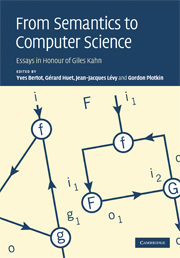Book contents
- Frontmatter
- Contents
- List of contributors
- Preface
- 1 Determinacy in a synchronous π-calculus
- 2 Classical coordination mechanisms in the chemical model
- 3 Sequential algorithms as bistable maps
- 4 The semantics of dataflow with firing
- 5 Kahn networks at the dawn of functional programming
- 6 A simple type-theoretic language: Mini-TT
- 7 Program semantics and infinite regular terms
- 8 Algorithms for equivalence and reduction to minimal form for a class of simple recursive equations
- 9 Generalized finite developments
- 10 Semantics of program representation graphs
- 11 From Centaur to the Meta-Environment: a tribute to a great meta-technologist
- 12 Towards a theory of document structure
- 13 Grammars as software libraries
- 14 The Leordo computation system
- 15 Theorem-proving support in programming language semantics
- 16 Nominal verification of algorithm W
- 17 A constructive denotational semantics for Kahn networks in Coq
- 18 Asclepios: a research project team at INRIA for the analysis and simulation of biomedical images
- 19 Proxy caching in split TCP: dynamics, stability and tail asymptotics
- 20 Two-by-two static, evolutionary, and dynamic games
- 21 Reversal strategies for adjoint algorithms
- 22 Reflections on INRIA and the role of Gilles Kahn
- 23 Can a systems biologist fix a Tamagotchi?
- 24 Computational science: a new frontier for computing
- 25 The descendants of Centaur: a personal view on Gilles Kahn's work
- 26 The tower of informatic models
- References
16 - Nominal verification of algorithm W
Published online by Cambridge University Press: 06 August 2010
- Frontmatter
- Contents
- List of contributors
- Preface
- 1 Determinacy in a synchronous π-calculus
- 2 Classical coordination mechanisms in the chemical model
- 3 Sequential algorithms as bistable maps
- 4 The semantics of dataflow with firing
- 5 Kahn networks at the dawn of functional programming
- 6 A simple type-theoretic language: Mini-TT
- 7 Program semantics and infinite regular terms
- 8 Algorithms for equivalence and reduction to minimal form for a class of simple recursive equations
- 9 Generalized finite developments
- 10 Semantics of program representation graphs
- 11 From Centaur to the Meta-Environment: a tribute to a great meta-technologist
- 12 Towards a theory of document structure
- 13 Grammars as software libraries
- 14 The Leordo computation system
- 15 Theorem-proving support in programming language semantics
- 16 Nominal verification of algorithm W
- 17 A constructive denotational semantics for Kahn networks in Coq
- 18 Asclepios: a research project team at INRIA for the analysis and simulation of biomedical images
- 19 Proxy caching in split TCP: dynamics, stability and tail asymptotics
- 20 Two-by-two static, evolutionary, and dynamic games
- 21 Reversal strategies for adjoint algorithms
- 22 Reflections on INRIA and the role of Gilles Kahn
- 23 Can a systems biologist fix a Tamagotchi?
- 24 Computational science: a new frontier for computing
- 25 The descendants of Centaur: a personal view on Gilles Kahn's work
- 26 The tower of informatic models
- References
Summary
Abstract
The Milner-Damas typing algorithm W is one of the classic algorithms in computer science. In this paper we describe a formalized soundness and completeness proof for this algorithm. Our formalization is based on names for both term and type variables, and is carried out in Isabelle/HOL using the Nominal Datatype Package. It turns out that in our formalization we have to deal with a number of issues that are often overlooked in informal presentations of W.
“Alpha-conversion always bites you when you least expect it.”
A remark made by Xavier Leroy when discussing with us the informal proof about W in his PhD thesis.
Introduction
Milner's polymorphic type system for ML is probably the most influential programming language type system. The second author learned about it from a paper by Clément et al. He was immediately taken by their view that type inference can be viewed as Prolog execution, in particular because the Isabelle system, which he had started to work on, was based on a similar paradigm as the Typol language developed by Kahn and his coworkers. Milner himself had provided the explicit type inference algorithm W and proved its soundness. Completeness was later shown by Damas and Milner. Neither soundness nor completeness of W are trivial because of the presence of the Let-construct (which is not expanded during type inference).
Information
- Type
- Chapter
- Information
- From Semantics to Computer ScienceEssays in Honour of Gilles Kahn, pp. 363 - 382Publisher: Cambridge University PressPrint publication year: 2009
References
Accessibility standard: Unknown
Why this information is here
This section outlines the accessibility features of this content - including support for screen readers, full keyboard navigation and high-contrast display options. This may not be relevant for you.Accessibility Information
- 6
- Cited by
